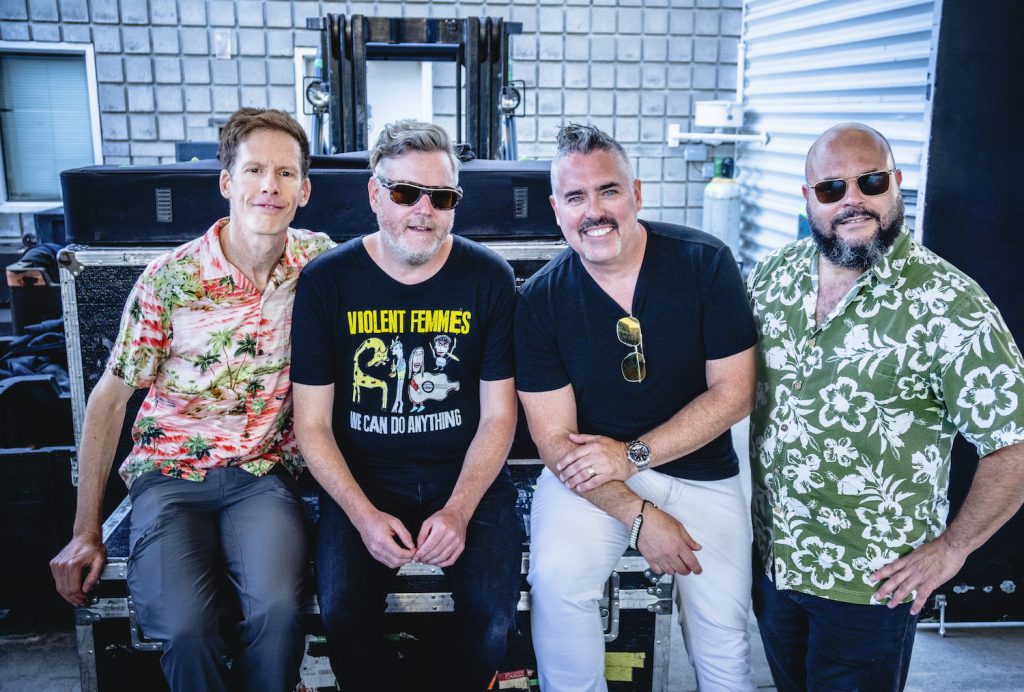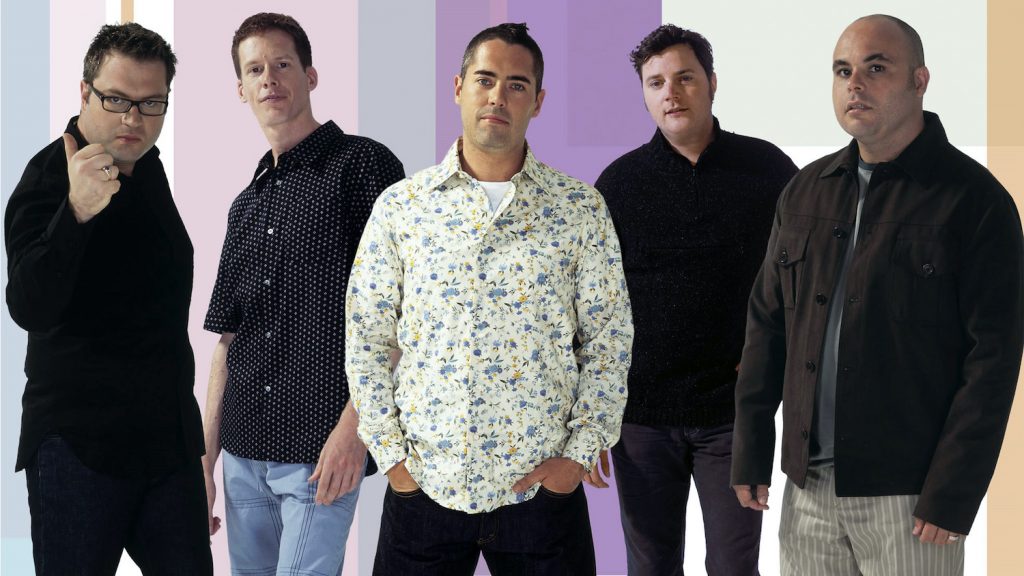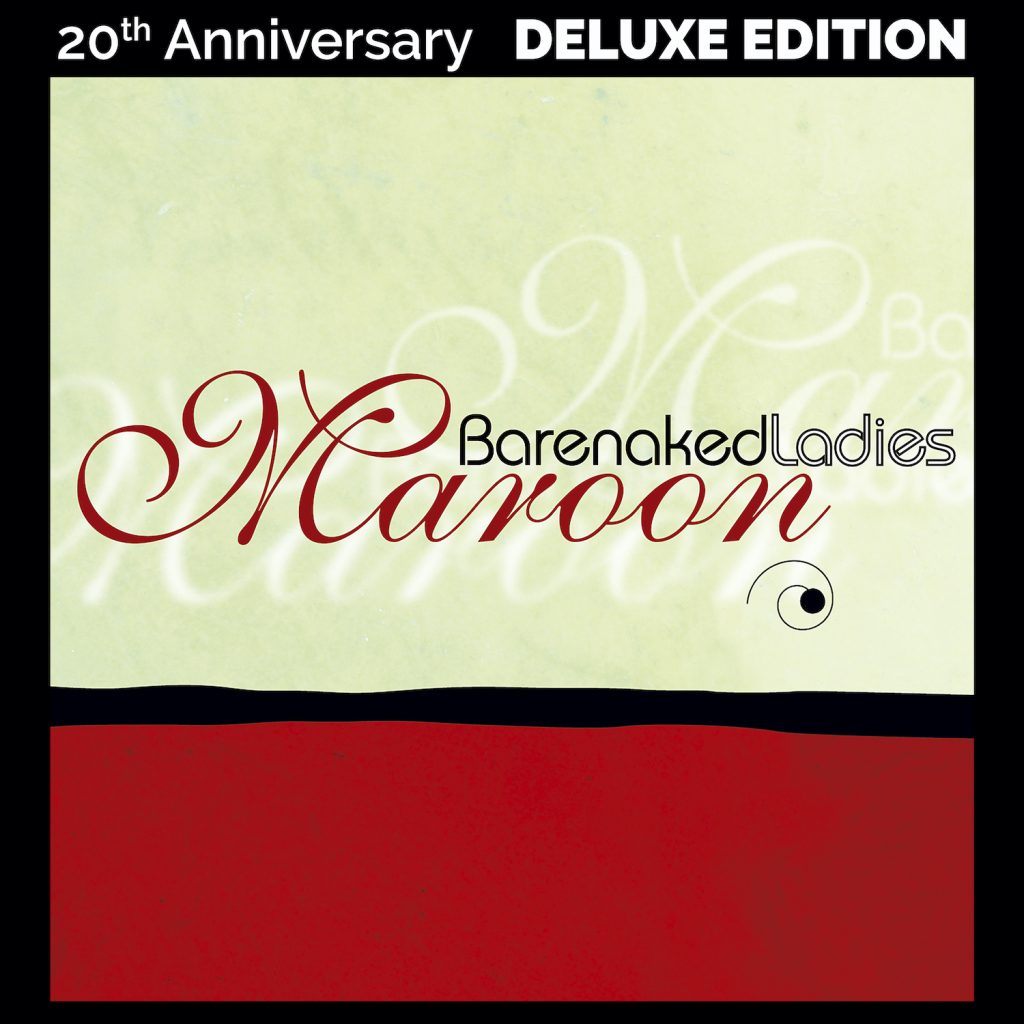
Back in 2000, Barenaked Ladies’ Maroon was its own sort of panacea for America’s millennium blues. The Toronto quintet’s fifth studio album is a slightly demented stew of high-strung mirth, dark emotional corners and politically charged angst. Recently reissued on double vinyl and as a deluxe digital edition by Rhino to mark its 20th anniversary, Maroon is packed with big ideas and clever hooks. Even so, the album made a hard stop at number five in the U.S., a relative disappointment after Stunt’s number-one showing in 1998. (This was back when chart success meant more than Spotify plays.)
Some might argue that Maroon hasn’t aged quite as well as, say, 1994’s highly underrated Maybe You Should Drive. In at least one sense, though, it proved to be a pivotal album for co-founder Ed Robertson and the rest of BNL, signaling an eventual return to more realistic cult-band expectations in the U.S. after a few overachieving years. Since then, they band has taken the 2009 departure of co-founder Steven Page in stride while continuing to pump out strong albums as a quartet.
Robertson talked with MAGNET about the making of Maroon and its proper place in BNL history. He also had something to say about Canadian bands’ persistent difficulties south of the border.
When you look back on the recording of Maroon, what are some things that stand out?
It was really exciting to make that record. On the heels of the success of Stunt, we really felt like we had the support of the record company, and in some ways it felt like we knew what we were doing. Our A&R person, Sue Drew—whom we totally loved and respected—put us together with Don Was. I must admit I had a little trepidation about going to work with this big Triple-A producer dude. But Don just hit the ground running and sunk into the vibe. He knew the demos inside and out; he had notes on the lyrics. We were like, “Oh, so that’s why he’s a big-name producer, because he’s really fucking great at it.” Jim Scott did the engineering and—let’s be honest—did a lot of the producing, as well. He actually brings a road case of vibe to any session he does … seriously, a trunk of tapestries, candles, neon signs, gear and gadgets.
So you guys were pretty confident going into this one.
There certainly was a confidence boost from the success of Stunt. But, hey, I just turned 50, I’m 32 years into this band, and I’m still nervous when I play new songs for the guys or put new material out. It’s stressful, and I just want to know that I connected. With Maroon, I feel like I got more introspective and melancholy, and I was more honest about some things. Still, there’s always that insecurity that drives you to write and perform in the first place.

What was it like working with Don Was?
He becomes like another band member. He was in the room with us when we were doing takes—we’d never experienced that before. Generally, the producer is in the control room with the engineer. He came with a veritable cornucopia of technique.
Was it a fussed-over recording process?
I’d say it was pretty organic. We brought this Canadian work ethic to the table. We did long days and worked fast, because we were in Los Angeles, away from our young families. There was a real energy to the process.
Some 20 years later, how does Maroon sit with you now?
I almost never listen to our records, unless I have to approve a remix or a re-master. (Drummer) Tyler (Stewart) might say to me, “I was listening to Born On A Pirate Ship the other day, and this or that track is really exciting.” And I’d say, “Why the fuck would you listen to Born On A Pirate Ship? I’d rather listen to the new Bahamas record.” But when I listened to the vinyl remaster of Maroon, I really enjoyed it. I think it was partly reminiscing about that really fun recording process. But part of it, too, was that it’s a really ambitious record. When I listen to the first record, I hear the excitement and naiveté of the band. I hear the mistakes; I hear the songs I wish I could tweak now. When I listened to Maroon, I was really proud of it. It was funny to be surprised by your own record.
When people talk about the inability of Canadian acts to find success in America, they often cite Barenaked Ladies as the rare exception. What did you guys do right?
You can never discount the luck portion of it, of course. But we fucking worked our asses off. I remember back in 1991 or ’92, we broke the attendance record for the Western Fair in London, Ontario, previously set by Captain & Tennille. We played to more than 14,000 people, and then we drove an hour and a half to Detroit and played a dance night at the State Theatre in front of 400 people who did not want us there. That can be really discouraging. A lot of bands are like, “We’re playing arenas in Ontario, why would we want to go back to the clubs in the U.S.?” And the answer is: Because there are 12,000 clubs in the U.S. instead of the 35 here—and there are multiple cities bigger than our biggest city. We also had the really good timing of Sarah McLachlan on a meteoric rise. We had the same manager, and Terry (McBride) would say, “Oh, you can have Sarah on the bill if you take Barenaked Ladies opening.” At these big festivals, we’d get on the bill, and we had such a strong live show that we’d get invited back.
After they cleaned up all the macaroni, they’d invite you back.
Yeah. [Laughs] Our motto has always been: Just let us in the door, and we’ll knock it out of the fucking park.
What’s a band to do these days? Touring is a prime source of income, and it’s not looking good for at least the next six months.
It’s weird, but we’re also really fortunate. We’ve been doing this a really long time, and we’re able to take a hiatus. My biggest stress was making sure we could keep paying our road crew. We’ve got guys who’ve been with us since ’91. In the meantime, I’m really enjoying not sleeping on a tour bus.
—Hobart Rowland







